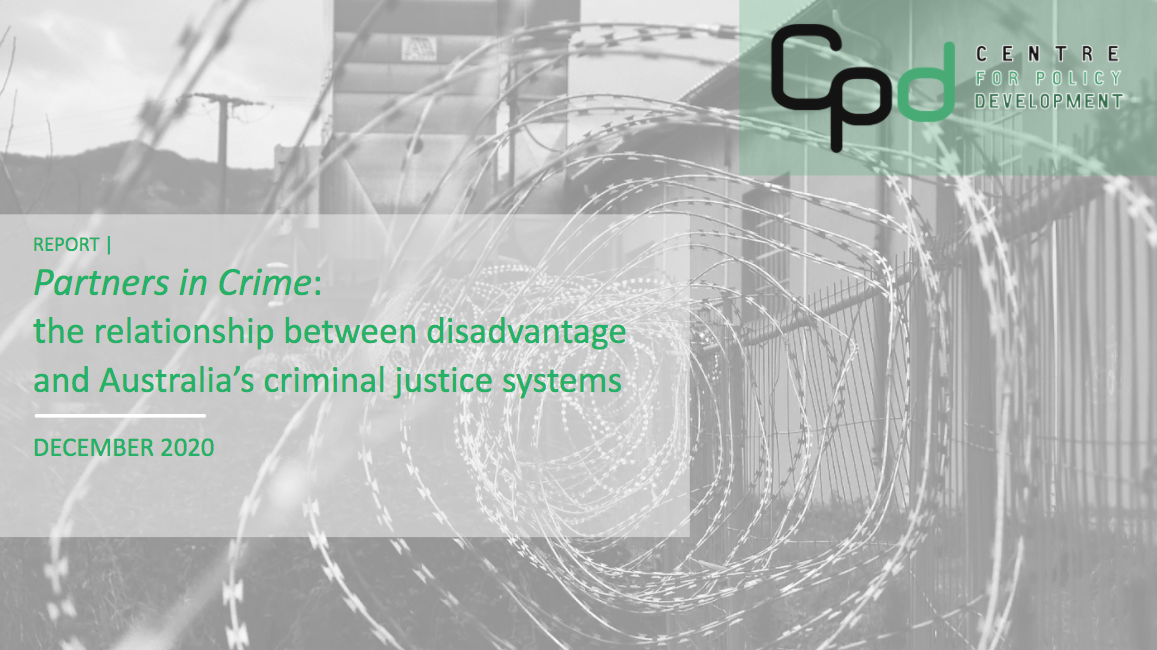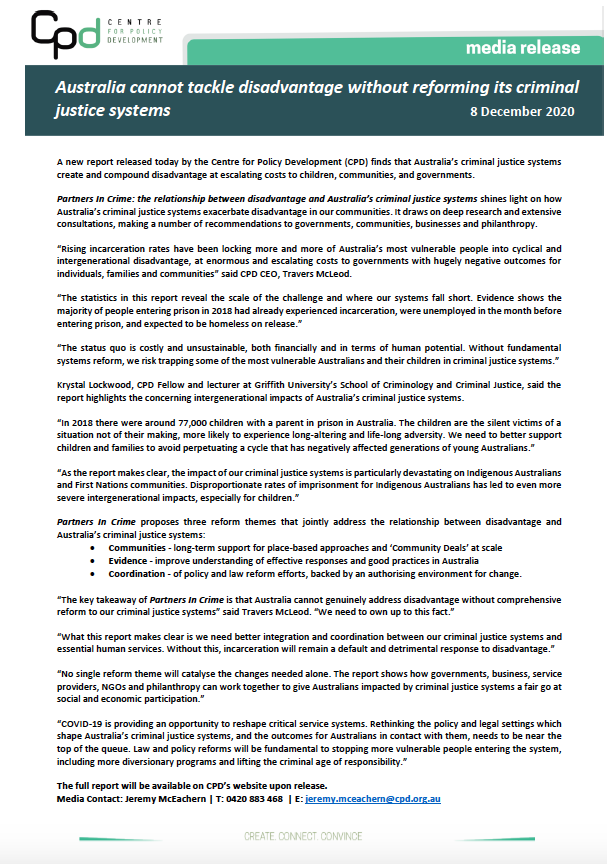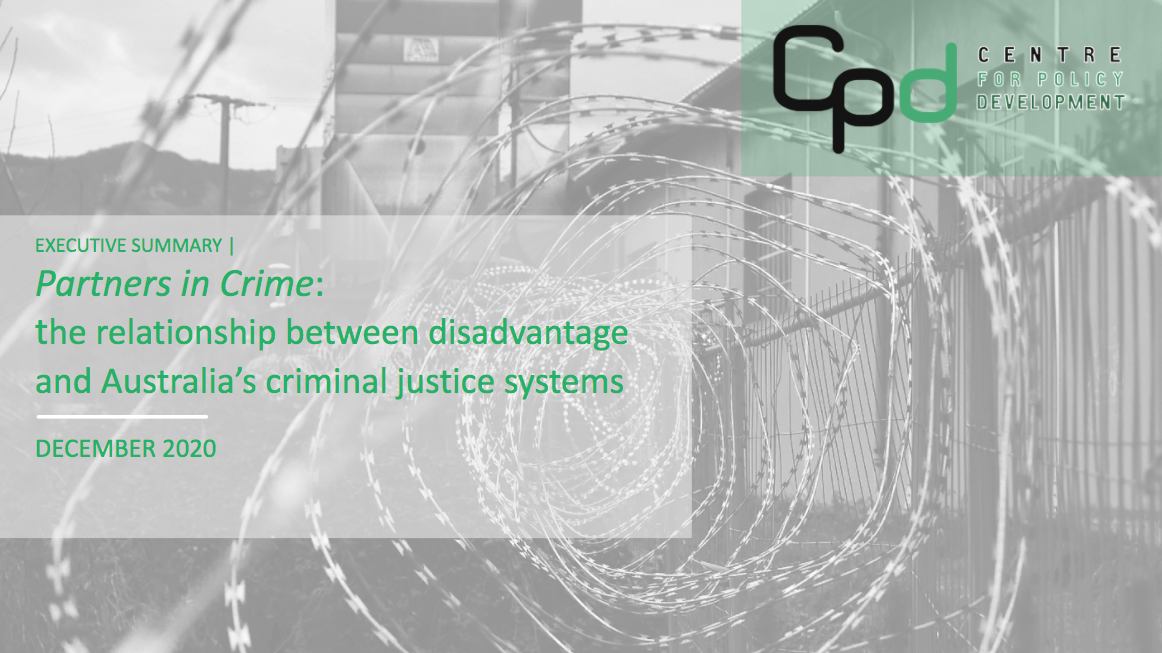The Centre for Policy Development is pleased to make available a report on the relationship between disadvantage and Australia’s criminal justice systems.
 |
 |
 |
||
| Partners in Crime: the relationship between disadvantage and Australia’s criminal justice systems | Media Release | Executive Summary |
The report draws on findings from a range of consultations with experts from across the sector including academics, service providers, practitioners, government and community actors from multiple jurisdictions, through individual consultations, roundtable discussions, field trips and conferences.
Partners in Crime found that disadvantage for Australia’s most vulnerable people is compounded as they pass through one of ten criminal justice systems — one for each state and territory, one federal system and a de facto tenth system, as all systems are experienced differently by Aboriginal and Torres Strait Islander peoples. These systems have increasingly become the default policy response to complex disadvantage. As Professor Eileen Baldry, Leanne Dowse and Melissa Clarence have pointed out, when people experience persistent disadvantage and have complex needs they “don’t just fall through the cracks, they are directed into the criminal justice conveyor belt”, a cycle which is easier to enter than to leave.
These systems are trapping more individuals, families and communities in cycles of disadvantage. Before COVID-19, we were jailing more people than at any time since 1900, in both total number and per capita. Most Australian states have an incarceration rate above the global average, except the ACT and Victoria.
The report finds that Australia’s prison population is now disproportionately made up of some of Australia’s most vulnerable people, including Aboriginal and Torres Strait Islander peoples, individuals with mental health conditions and disability, and people with a history of family incarceration. And criminal convictions are concentrated in a relatively small number of areas experiencing broad disadvantage.
Partners in Crime contends that for the most vulnerable Australians, contact with the criminal justice systems causes disadvantage and exacerbate vulnerability. A survey of prisoners showed that many face higher homelessness on release than on entry, and they also experience significant barriers to employment.
The report suggests that Australia cannot tackle disadvantage without comprehensive reform to its criminal justice systems, at the community and systems levels, backed up by evidence.
It proposes three drivers of change that can work together to address this challenge, with no one change sufficient.
- Communities — long-term investment in local communities to support vulnerable families and people most at risk of entering criminal justice systems, including ‘Community Deals’ for justice reinvestment;
- Evidence — gather better data to improve understanding of effective responses and inform new strategies, including an Australian ‘what works’ centre; and
- Coordination — of policy and law reform efforts, underpinned by an intergovernmental process with a broad coalition to build the authorising environment for change.
The COVID-19 pandemic has brought key issues in the criminal justice system into sharp focus and offers an opportunity to look at the law and policy reforms which are available and required to re-imagine how systems can deliver for all Australians. There is a unique opportunity for governments, philanthropy, service providers, communities, legal practitioners, and employers across jurisdictions to realise these changes.
Quotes from CPD on the release of Partners in Crime: the relationship between disadvantage and Australia’s criminal justice systems:
Travers McLeod, CEO, Centre for Policy Development
“Rising incarceration rates have been locking more and more of Australia’s most vulnerable people into cyclical and intergenerational disadvantage, at enormous and escalating costs to governments with hugely negative outcomes for individuals, families and communities”
“The status quo is costly and unsustainable, both financially and in terms of human potential. Without fundamental systems reform, we risk trapping some of the most vulnerable Australians and their children in criminal justice systems.”
Krystal Lockwood, CPD Fellow and lecturer at Griffith University’s School of Criminology and Criminal Justice
“In 2018 there were around 77,000 children with a parent in prison in Australia. The children are the silent victims of a situation not of their making, more likely to experience life-long adversity. We need to better support children and families to avoid perpetuating a cycle that has negatively affected generations of young Australians.”
Peter Harmsworth, former Director-General, Office of Corrections (Victoria: 1987 – 1992) and former Secretary, Department of Justice (Victoria: 1998 – 2003)
“Pockets of persistent disadvantage have existed across a small number of communities in Australia for many decades, especially in Aboriginal and Torres Strait Islander communities. The disadvantage experienced is cyclical and intergenerational in nature which has been driven in part by a person’s involvement with the criminal justice system. It has become a fairly blunt instrument in dealing with many of society’s social, economic and medical ailments. Policy changes over the last two decades has effectively widened the net with prison numbers soaring and recidivism remaining high. Correctional budgets have been stretched with the focus more on human warehousing than on rehabilitation and breaking the offending cycle.”
“Significant and deep change is needed. International research points to successful interventions and policy changes in a number of jurisdictions that have led to falling prison numbers and falling recidivism rates without impacting on community safety levels. A better understanding of what works in improving the criminal justice system, in effectively engaging governments to better understand the social and financial benefits of policy reforms, and adopting more place based approaches to address the geographically-located drivers of disadvantage for ex-prisoners and their families through bringing together key supports across all levels of government, can only lead to fairer and more just societies where disadvantage is reduced.”
Acknowledgements
Partners in Crime: the relationship between disadvantage and Australia’s criminal justice systems was undertaken by a team of CPD researchers, including Frances Kitt, Allison Orr, Caitlin McCaffrie, Travers McLeod, and CPD research intern Ben Maltby, with assistance from Rod Marsh and Peter Harmsworth AO. CPD also formed an informal advisory group, drawn from members of CPD’s Research Committee and Board.
This report has been developed under CPD’s ongoing Effective Government Program, which examines the role of government and public policy in the 21st century, including the role and delivery of effective services in addressing social and economic disadvantage in Australia. The analysis presented in this report was initially undertaken as part of a study for the Paul Ramsay Foundation. Together, we hope that the analysis and ideas help to encourage fundamental reforms to our criminal justice systems and thereby disrupt cycles of persistent disadvantage in Australia.
Our research for this report informed our Transitions to Employment Roundtable series which considered interventions that government, business and philanthropy could pursue to tackle long term unemployment and underemployment for the groups in our society facing the greatest disadvantage, including those in contact with the criminal justice system. The final report draws on those conversations, as well as those which have taken place as part of our ongoing ANU-CPD Policy Dialogue series.
We are grateful to all those who participated and made this report possible, particularly those with personal experience of Australia’s criminal justice systems, many of whom have provided feedback throughout the development of this report. We hope it can help Australian communities to build back better in the wake of COVID-19.
Links and related media
- Partners in Crime: the relationship between disadvantage and Australia’s criminal justice systems
- Media Release
- Executive Summary
- Australia’s incarceration rate jumps 47 per cent in two decades, Travers McLeod talks to NewsRadio’s Thomas Oriti about Partners in Crime, 10 December 2020
- Travers McLeod on increased incarceration rates, Mornings with Gareth Parker on 6PR
- Paige Taylor, Prison population high as crime falls, The Australian, 10 December 2020
- Sarah Matthews, NT has higher proportion of incarcerated people than USA, NT News, 15 December 2020
- Travers McLeod, Frances Kitt & Krystal Lockwood, Prison stems from disadvantage and entrenches it, The Australian, 10 December 2020
- Blueprint for Regional & Community Job Deals
- ANU-CPD Policy Dialogue, ‘The Australian criminal justice system and deep disadvantage’
- Transitions to Employment: People in contact with the criminal justice system
- 2020 John Menadue Oration with Professor Megan Davis, ‘Can Australia Deliver?’
- Travers McLeod, Here are 10 steps to build a stronger Australia after coronavirus, The Guardian, 05 May 2020
- Sam Mostyn and Travers McLeod, Coronavirus is a human crisis beyond most of our scariest dreams – we will need to restart our society, The Guardian, 04 April 2020
- Sam Mostyn & Travers McLeod, Australia needs to find its heart, brain and courage to recover from the COVID nightmare, The Guardian, 11 October 2020



